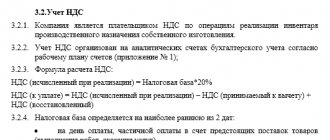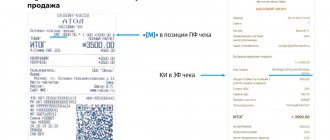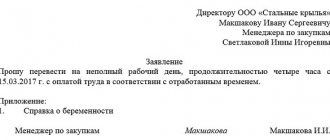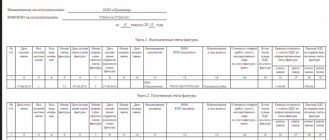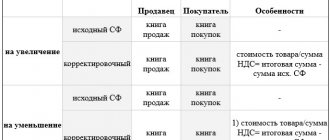Consider the following situation: the founder deposits a loan to pay employees' salaries. In this case, the money is returned through a current account to the card of the company founder. In this regard, the question arises: is an online cash register needed for such operations? After all, Law No. 54-FZ deals with loans only for the purchase of goods, works, and services.
In the example you gave, the loan is provided by the founder, that is, an individual to the organization’s cash desk for a specific purpose other than that specified in Federal Law No. 54-FZ of May 22, 2003 “On the use of cash register equipment when making payments in the Russian Federation.” The regulatory authorities have not yet given official explanations of what the company should do in such a situation. Moreover, Law No. 54-FZ does not contain the meaning of the expression “payment for goods, work, services.” Based on the literal interpretation of the current law and the available official explanations, we can conclude that there is no obligation to use cash register equipment in the specified example. Let us consider in more detail the procedure for applying the current legislation on online cash registers when providing and repaying loans.
Indeed, Federal Law No. 192-FZ of July 3, 2021 amended Federal Law No. 54-FZ of May 22, 2003 “On the use of cash register equipment when making payments in the Russian Federation”, in particular, the concept of “settlements” was expanded . The legislator introduced additional meanings to the term for operations to provide and repay loans to pay for goods, work, and services (including pawnshops providing loans to citizens secured by things belonging to citizens and activities for storing things). From the literal interpretation of Law No. 54-FZ, cash register equipment does not need to be used when providing and repaying loans issued for purposes other than payment for goods, works, and services.
Moreover, according to Article 4 of Law No. 192-FZ, organizations and individual entrepreneurs, when providing loans to pay for goods, work, and services, have the right not to use cash register equipment and not to issue (send) strict reporting forms until July 1, 2021.
As we see, this rule does not apply to the repayment (repayment) of a loan provided to pay for goods, work or services. In such a situation, you can be guided by the norm of paragraph 4 of Article 4 of Law No. 192-FZ, according to which organizations and individual entrepreneurs, when making non-cash settlements with individuals (except for settlements using electronic means of payment), have the right not to use cash register systems and not to issue (send) forms strict reporting until July 1, 2021.
Unfortunately, the changes did not bring complete clarity to the issue of using cash register systems when granting and repaying loans. Thus, doubts remain regarding the procedure for determining the nature of the purposes of loans, which means the question of the need to use cash registers remains open. The definitions of granting and repaying a loan are also not unambiguous.
Is the lender obliged to use cash register when providing a loan or when it is repaid: what does the law say?
In accordance with Article 1.1 of Law 54-FZ (LINK), calculations for the purposes of using cash registers include the issuance (return) of borrowed funds to pay for goods, work, and services. An online cash register is required for entrepreneurs and legal entities (hereinafter referred to as enterprises) to conduct payments throughout Russia, except for the exceptions expressly stated in the law (Clause 1, Article 1.2 of Law 54-FZ).
The cash register is used only by users. Those. persons carrying out settlements. CCP users draw up a cash register receipt (or BSO) and provide it to the consumer (client) on paper or electronically (clause 2 of Article 1.2 of Law No. 54-FZ). But users - those who are obliged to work with cash register systems - can only be legal entities and entrepreneurs (Article 1.1 of Law No. 54-FZ). This obligation does not apply to citizens without registration as individual entrepreneurs, even if they sell something.
From all of the above we can draw a simple conclusion:
- The online cash register is used only by those who receive money from the buyer (client) or pay it to the buyer (client) (clause 1 of article 4.3., clause 2 of article 1.2 of law No. 54-FZ). At the same time, the receipt (payment) of money occurs within the framework of operations classified by Law No. 54-FZ as “settlements”;
- someone who is a buyer (client) does not use the online cash register for payments at all (letters from the Federal Tax Service of Russia No. AS-4-20 / [email protected] dated 08/10/2018 - LINK, from the Ministry of Finance of the Russian Federation No. 03-01-15 /52265 from 07/25/2018 - LINK). This statement applies even to enterprises that find themselves in the role of consumers. The basis is paragraph 2 of Article 1.2 of Law No. 54-FZ, which states that the seller, and not the consumer, punches and transfers cash documents. Additionally, the Russian Ministry of Finance speaks about the “realization” nature of calculations in its letter dated October 05, 2021 No. 03-01-15/71861 - LINK. In which the Ministry of Finance indicates that “CCT is used by a person who sells goods, performs work, or provides services.”
But still, should the lender issue a cashier's check (CSR) when issuing (repaying) a loan? Yes. Based on all of the above, the lender is a user within the meaning of the law on cash register systems. But only on the condition that his loan is used to purchase goods (work, services) that the lender himself sells. This means that at the time of granting such a loan and its full or partial closure, the lender is obliged to use the cash register system.
Changes in working with cash registers in 2021
In 2021, a large number of companies and individual entrepreneurs switched to online cash registers. In 2021, there were changes to the restrictions for online cash registers. Now cash registers with the previous memory format 1.0 cannot be used. Online cash register information must be transmitted in format 1.05 and 1.1. In case of violation of this requirement, the company will face a fine of 30,000 rubles.
Until July 1, 2021, companies that accept utility payments from the population have the right to operate without cash register systems. Organizations providing services to the public (key making, childcare, shoe repair), even after the deadline, will have the right to issue a BSO instead of a cash receipt.
Sellers of magazines and books are exempt from the obligation to use online cash register systems in their work. Moreover, the exemption will not depend on the places in which their goods are sold: through a specialized retail outlet, a newsstand, and other places.
Owners of mechanical devices for selling goods are not required to use cash registers. To not use a cash register, this device must meet the following conditions:
- there is no connection to the electrical network;
- does not operate on batteries or batteries;
- accepting payments only in coins (for example, 10 rubles).
Law 54-FZ obliges organizations to issue checks not only when money is received, but also in some situations when it is issued. At the same time, a check with the “expense” sign is punched. Such checks are issued when winnings are paid by gambling companies.
Payments related to the issuance or return of accountable funds are not carried out through the cash register. Only if an organization makes a payment to an individual (for example, under a rental agreement, for work performed), a check with the attribute “expense” is issued.
Important! From July 2021, companies will be required to issue checks for barter transactions.
In calculations for loans issued to individuals, the use of cash registers is also required:
- in case of issuing loans, the online cash register will need to be used from July 1, 2021;
- In case of accepting loan repayment, the online cash register must be used from June 1, 2021.
The obligation to use the online cash register depends on the purpose of the loan agreement
In order for the cash register to participate in the process of granting (depositing) a loan, it is necessary to check the intended purpose of this borrowing. The Federal Tax Service of Russia states in its letter No. ED-4-20 / [email protected] dated September 18, 2018 (LINK): the purpose of borrowing affects the need for cash register participation in the settlement transaction.
The purpose of the loan should only be payment for the goods sold by the lender. Then this operation will be recognized as a settlement by Law No. 54-FZ, and all its requirements will apply to it. Therefore, initially, the loan agreement should clearly state what the funds are provided for: for the purchase of goods, works, services of the lender.
On cases of using cash register systems, including when issuing and repaying a loan
Answer In accordance with paragraph 1 of Article 1.2 of Law No. 54-FZ[1]
cash register equipment included in the register of cash register equipment is used on the territory of the Russian Federation without fail by all organizations and individual entrepreneurs when making payments, except for cases established by this Federal Law.
Clause 2 of Article 1.2 of Law No. 54-FZ establishes that when making a payment, the user is obliged to issue a cash receipt or a strict reporting form on paper and (or) if the buyer (client) provides the user with a subscriber number or email address before the calculation, send a cash receipt a check or strict reporting form in electronic form to the buyer (client) to the provided subscriber number or email address (if it is technically possible to transmit information to the buyer (client) in electronic form to the email address), unless otherwise provided by this Federal Law.
At the same time, according to Article 1.1 of Law No. 54-FZ, settlements are acceptance (receipt) and payment of funds in cash and (or) by bank transfer for goods, work, services, acceptance of bets, interactive bets and payment of funds in the form of winnings when making activities for organizing and conducting gambling, as well as accepting funds when selling lottery tickets, electronic lottery tickets, accepting lottery bets and paying out funds in the form of winnings when carrying out activities for organizing and conducting lotteries. For the purposes of this Federal Law, settlements also mean the acceptance (receipt) and payment of funds in the form of advance payment and (or) advances, offset and return of advance payment and (or) advances, provision and repayment of loans to pay for goods, works, services ( including pawnshops lending to citizens on the security of things belonging to citizens and activities for storing things) or providing or receiving other consideration for goods, work, services.
Thus, the Organization is obliged to use CCP in the following cases:
— receipt and transfer of funds, including the amount of advances received (transferred) and prepayments (both in cash and non-cash);
— offset or return of the advance or prepayment amount;
— providing or receiving a counter-representation (for example, conducting offsets)
for goods (work, services) sold by the Organization to individuals, as well as in cases of provision and repayment of loans to pay for goods, work, services.
In other cases of receipt (transfer) of funds (not related to payment for goods, works, services sold by the Organization), the use of cash register is not required.
This opinion is confirmed by Letter of the Ministry of Finance of the Russian Federation dated October 26, 2018 No. 03-01-15/77197:
"Question:
On the use of cash registers and the issuance of a cash receipt when an organization pays funds.
Answer:
Taking into account the interrelated provisions of Federal Law N 54-FZ, cash register is used by a person who sells goods, performs work, provides services and who generates and transfers (sends) a cash receipt to the buyer (client). Similarly, when providing and repaying loans to pay for goods, work, and services, cash register is used by the lender.
In connection with the above, when an organization makes a payment of funds in the cases specified in the appeal, cash register is not used and a cash receipt is not issued.”
At the same time, we note that within the framework of one consultation it is not possible to cover the entire variety of business transactions that require the use of cash register systems. At the same time, we draw your attention to the fact that the Organization has the opportunity to seek clarification of the procedure for applying cash registers for a specific business transaction.
Regarding loan repayment operations, we note the following:
From the above norms, in our opinion, we can conclude that CCT is used, in particular, by organizations in the case of granting and repaying loans issued to pay for goods, work, and services.
Thus, not all loans are subject to Law No. 54-FZ, but only targeted loans provided to pay for goods (works, services). It should be noted that Law No. 54-FZ does not decipher what is meant by loans to pay for goods (work, services).
An explanation on this issue was given in the Letter of the Federal Tax Service of the Russian Federation dated October 19, 2018 No. ED-4-20 / [email protected] :
“For the purposes of Federal Law No. 54-FZ, the provision of loans to pay for goods, work or services should be understood as the provision by an organization (individual entrepreneur) to the buyer (client) of a deferment or installment plan for payment for goods, work or services.
Taking into account the above, the provision of a loan should be considered as a change in the deadline for fulfilling the obligation to provide funds as part of settlements (for example, under a purchase and sale agreement), namely: the transfer of funds by the buyer (client) to the seller later than receipt of the goods, and not at the time of such transfer, or as a change in the payment procedure, in which the latter is made not in the full amount of the settlement, but in parts.
Accordingly, repayment of loans is the fulfillment of the obligation to pay by the buyer (client) for previously received goods, works or services as part of the ongoing settlements.
The provisions on commercial and commodity credit established by the civil legislation of the Russian Federation are applicable to the provision of loans to pay for goods, work or services in the sense of Federal Law No. 54-FZ.
Thus, if an organization provides
(individual entrepreneur)
loans not related to deferment or installment payments for goods,
work or services,
as well as when repaying such loans by
employees, including interest on them,
the use of cash register equipment is not required.”[2]
In the Letter Ministry of Finance of the Russian Federation dated March 28, 2019 No. 03-01-15/21078
The following explanations are given:
“Taking into account the definition of the term “settlements” of the Federal Law of May 22, 2003 N 54-FZ “On the use of cash register equipment when making payments in the Russian Federation” (Article 1.1) in the case of credit consumer cooperatives and agricultural credit consumer cooperatives (hereinafter - cooperatives) loans not related to deferment or installment payment for goods, work or services, as well as when repaying such loans, the use of cash register equipment is not required. In addition, the use of cash register equipment is not required when cooperatives accept contributions from their members.”
Thus, according to the official explanations of the Ministry of Finance of the Russian Federation and the Federal Tax Service of the Russian Federation, for the purpose of applying Law No. 54-FZ, the provision of a loan is understood as the provision by an Organization selling goods (work, services) of a deferment in payment for these goods, works, services. At the same time, the provision and repayment of a loan that is not related to the purchase of goods (work, services) from the lender does not entail the emergence of an obligation to use cash register systems.
Consequently, organizations are obliged to use cash register systems only in cases where the buyer is provided with a deferment (installment plan) for payment for goods (work, services) sold by the Organization.
Since in the situation under consideration, the Organization issued a cash loan to the employee, which is not associated with a deferment or installment plan for payment for goods (apartments), then, in our opinion, the use of cash register is not required.
At the same time, we draw your attention to the earlier Letter of the Federal Tax Service of the Russian Federation dated September 18, 2018 No. ED-4-20/ [email protected] :
“The provisions of Article 1.1 of Federal Law N 54-FZ define the term “settlements”, which means, in particular, the acceptance (receipt) and payment of funds in the form of prepayment and (or) advances, offset and return of prepayment and (or) advances, provision and repayment of loans to pay for goods, work, services (including pawnshops lending to citizens on the security of things belonging to citizens and activities for storing things) or providing or receiving other consideration for goods, work, services.
Thus, the term “settlements” directly indicates the targeted nature of loans, for the implementation of which cash register equipment must be used, namely loans to pay for goods, work and services.
Taking into account the above, if the loan is not issued for the purpose of paying for goods (works, services), then the obligation to use cash register equipment does not arise for the lender.
It is important to note that both parties to the transaction must understand its terms, including those with no purpose, and be aware of the consequences of concluding an imaginary or feigned transaction.
Please note that, in accordance with paragraph 9 of Article 2 of Federal Law N 54-FZ, cash register equipment is not used when making non-cash payments between organizations and (or) individual entrepreneurs, with the exception of settlements carried out by them using an electronic means of payment with its presentation.
Thus, cash register equipment should be used for settlements between organizations and individual entrepreneurs in cash or with the presentation of an electronic means of payment.
It should be taken into account that by the legislation of the Russian Federation on the use of cash register equipment, the obligation to use cash register equipment is assigned to the organization or individual entrepreneur directly providing the loan, as well as receiving funds to repay the loan.”
From this explanation it follows that
organizations are required to use cash register systems in the case of granting (repaying) a targeted loan to pay for goods (works, services).
In accordance with paragraph 1 of Article 807 of the Civil Code of the Russian Federation, under a loan agreement, one party (the lender) transfers or undertakes to transfer into the ownership of the other party (borrower) money, things defined by generic characteristics, or securities, and the borrower undertakes to return the same amount of money to the lender ( the amount of the loan) or an equal number of things received by him of the same kind and quality or the same securities.
According to paragraph 1 of Article 808 of the Civil Code of the Russian Federation, a loan agreement between citizens must be concluded in writing if its amount exceeds ten thousand rubles, and in the case where the lender is a legal entity, regardless of the amount.
At the same time, paragraph 1 of Article 814 of the Civil Code of the Russian Federation establishes that if a loan agreement is concluded with the condition that the borrower uses the funds received for certain purposes (targeted loan), the borrower is obliged to ensure that the lender can exercise control over the intended use of the loan.
Thus, if the loan was specifically provided to an employee for the purchase of an apartment, and this condition is expressly provided for in the loan agreement, then we cannot completely eliminate the risk of claims from regulatory authorities associated with the non-use of cash register systems.
However, taking into account the existence of more recent clarifications from the Ministry of Finance of the Russian Federation and the Federal Tax Service of the Russian Federation, in our opinion, the risk of filing claims is not high.
College of Tax Consultants, July 18, 2021
[1] Federal Law No. 54-FZ dated May 22, 2003 “On the use of cash register equipment when making payments in the Russian Federation”, hereinafter referred to as Law No. 54-FZ
[2] A similar conclusion was made in the Letter of the Federal Tax Service of the Russian Federation dated October 25, 2018 No. ED-3-20 / [email protected]
Answers to the most interesting questions on our telegram channel knk_audit
Back to section
Situations of issuing (returning) a loan in which a cash register is not needed
The employer issued a loan to his employee for personal expenses, and not for the purchase of various goods from the same employer. In this case, the online cash register is not involved in the calculations. The basis is Article 1.1 of Law No. 54-FZ, which clearly indicates the narrow purpose of the loan. In this situation, there is no purchase from the lender using the borrowed funds issued by him.
In the event that a loan is issued to an employee or another person for the purpose of purchasing goods, work, or services from another enterprise, cash register equipment is also not used. Reason - Law No. 54-FZ talks about settlements with the creditor company for goods (work, services) sold by it (letter of the Ministry of Finance of Russia No. 03-01-15/71861 dated 10/05/2018).
When an organization issues a loan to its founder or director, its own employee or a third-party individual, but there is no reference anywhere to the purpose of these funds, then an online cash register is also not required. The reason is the lack of a purpose for borrowing. Article 1.1 of Law No. 54-FZ clearly states “for payment for goods, work, services.” Therefore, if it is not clear from the agreement where the borrowed funds are directed, the cashier’s check when issuing and returning such a loan is not punched. Reason: in the understanding of Law No. 54-FZ, no “calculation” arises with such an operation.
As for closing loans, if they were not used to pay for the benefits sold by the lender, then the online cash register is not used at the time of repayment of the loan debt.
A special place in settlement transactions is given to a loan received by an enterprise from its founder. Even if these funds are provided by the organization for the purchase of goods, works, services, an online cash register is not needed either at the time of receiving such a loan or when repaying it to the founder. The reason is that Law No. 54-FZ itself does not classify this operation as “settlements”.
CCT does not apply even when a loan is issued in a non-cash format and without presentation of an ESP by an enterprise of another organization or an entrepreneur for the purpose of purchasing goods, works, services from the lender (clause 9 of Article 2 of Law No. 54-FZ). The same applies to non-cash return of these funds.
A loan comes in more than just a monetary form. This could be, for example, a deferment or installment payment. Therefore, all of the above applies to any loan options.
Use of cash register systems for loans
According to the letter of the Ministry of Finance No. ED-4-20/18186 on the specifics of using cash registers in the case of loans, the cash register should be used in transactions for the sale of goods (works or services), if payment is made in cash, or by bank card through a terminal, or via the Internet. That is, the rules for applying the cash register in accordance with 54-FZ do not apply to those business entities whose activity is the provision of loans and credits. The Ministry of Finance also draws attention to the following: when a loan is issued for certain purposes (for example, to purchase any goods, or to pay for any services), then the issuance of a cash receipt will be mandatory. If funds are issued without specifying their intended use, then cash registers do not need to be used. It should be noted that the non-application of cash registers is possible only for transactions related to the provision of non-targeted loans (including loans issued secured by property or property rights). When a credit company sells any goods or provides certain services (for example, provides advice), then the receipt of revenue in this case must be accompanied by the generation of a cash receipt.
Important! The use of cash register systems when providing a loan will be mandatory from July 1, 2021.
Are cash receipts bounced when paying interest on a loan?
When interest is paid on a loan that was not provided for the purchase of goods from the lender, the indicated amounts do not pass through the cash register.
As for interest on loans immediately intended for the purchase of goods, works, and services of the lender, there are two points of view:
Point of view 1
It was expressed by the Federal Tax Service for Moscow in letter No. 17-26/2/ [email protected] dated September 25, 2019 - LINK. It states that the cash register system is used by the user when “providing and repaying loans to pay for goods and work, including when receiving interest on the loan from the borrower.”
Thus, the department believes that interest on a loan issued for the purchase of various goods from a lender is one of the forms of making a purchase. Without paying interest, the transaction will not take place, which means there will be no acquisition of goods. It follows from this that interest under a loan agreement is closely related to the goods, works, and services of the lender.
Moreover, according to Article 250 of the Tax Code of the Russian Federation, interest on loans is classified as non-operating income. When entering a cash receipt, in place of the attribute “Attribute of the subject of payment” (tag 1212), you must enter the value “15 – non-operating income”.
The procedure for generating cash receipts (CSR) is described in more detail on the website of the Federal Tax Service of Russia - https://kkt-online.nalog.ru. The necessary values and explanations can be found in the sections of the page “Menu” - “Guidelines”.
Point of view 2
A different opinion about interest is contained in Law No. 54-FZ itself. Its article 1.1 directly states: settlements are an operation for “providing and repaying loans to pay for goods, works, and services.” The percentages are not mentioned here.
They are only a reward, serve as payment for using the loan (clause 1 of Article 809 of the Civil Code of the Russian Federation - LINK). Moreover, the loan can be interest-free (clause 4 of Article 809 of the Civil Code of the Russian Federation). Thus, interest and loan are different types of payments. And interest has nothing to do with purchased goods, works and services. Therefore, when depositing interest, there is no need to use an online cash register.
Choose any point of view, but you need to understand that you will have to defend the second opinion.
CCT in the work of pawnshops
The activities of pawnshops include providing short-term loans, storing property, and providing services in the form of consultations. Even before July 1, 2021, pawnshops may not have used cash registers. Instead, all transactions related to the issuance of loans were formalized on strict reporting forms (SSR):
- The BSO in the form of a pledge ticket was confirmation of the issuance of the loan.
- The safety receipt was confirmation of the provision of services related to the storage of property.
In accordance with Law 54-FZ, from July 1, 2021, companies and entrepreneurs using BSO in their work had to switch to automated systems, which are essentially cash register systems. At the same time, pawnshops, as before, have the right not to use the cash register when reflecting settlements on issued loans, such as debt repayment and interest payments. The use of online cash registers in the activities of pawnshops is necessary when selling collateral that was not claimed by the debtor, as well as in the case of providing consulting services.
conclusions
When issuing and repaying a loan, the online cash register is used only when the loan was intended to pay for goods, work, or services of the lender. Moreover, it is necessary that the loan agreement reflects such a designated purpose of the funds. The exception is the provision in non-cash form and without presentation of an electronic means of payment of a loan to another organization or individual entrepreneur for the purchase of his goods, works, services from the lender.
Which individual entrepreneurs are exempt from online cash registers until 2021 and under what conditions.
Is it necessary to issue a cashier's check when receiving payment from an individual through a bank?
Is CCP applied if an investment contribution is received?
Application of cash register when repaying a loan by an employee
Let's assume that an organization issued a loan to its employee. The employee repaid this loan independently, through a bank branch. Organizations when working with the public from July 1, 2021 must use an online cash register, so the question arises of how an employee can repay his loan. And should the organization use CCP in this case? The answer to this question will be as follows: there is no need to use the cash register when repaying a loan before July 1, 2021, so the employee returns the loan received before the specified time in a way convenient for him. And from this date, the use of a cash register will be mandatory.
Loan repayment check – nature of the loan
The obligation to use cash register equipment arises for a company or individual entrepreneur in cases where a loan was taken out to pay for goods, work and services. Such use of borrowed funds corresponds to its legal nature, and therefore there is a need to include in the agreement on the provision of funds a condition that the recipient of the loan will spend the funds only for the purposes specified in the agreement
. This will make it possible to control the intended use of borrowed funds by their owner.
Answers to common questions about a check when repaying a loan
Question #1:
Are there any clarifications from the Russian Ministry of Finance or the Federal Tax Service regarding the use of online cash registers when issuing or repaying loans? Do you know for sure whether to issue a check when repaying a loan?
Answer:
No, at present, neither the Ministry of Finance of the Russian Federation nor the Federal Tax Service of the Russian Federation have provided comprehensive explanations on this issue. But it should be remembered that all ambiguities, contradictions and irremovable doubts regarding acts of legislation on taxes and fees should be interpreted in favor of taxpayers, fee payers, insurance premium payers, and tax agents.
Question #2:
Is the issuance of a loan to a company by its founder a special situation regulated by law?
Answer:
No, the fact that the loan was issued by the founder of the organization does not matter. From the point of view of the law, such a case is also considered as the provision of borrowed funds to the taxpayer by an individual.

